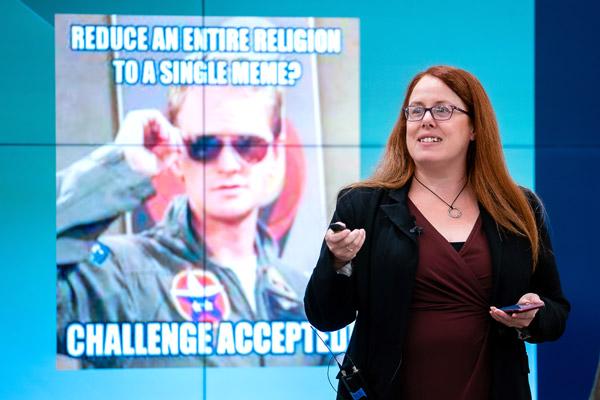
WASHINGTON — The image seems inoffensive on the surface: a figure of a gray-haired man, presumably God, with text that says: “I gave you free will so use it exactly as I command you to.”
It was one example of an image known as a meme offered by Heidi Campbell, a communications professor at Texas A&M University, who studies how such images can affect widespread perceptions of religion and of members of religious groups.
Memes — pronounced “meems” — are rampant and hard to avoid by anyone who uses social media, and while most may chuckle at some of the images, some warn that they can be used to spread erroneous or even detrimental views about various faiths and their members.
Campbell was one of more than a dozen panelists who participated in Washington Oct. 18 in a conference titled “Religion Beyond Memes,” which explored the role the images play in how some in society perceive certain faiths and those who practice them. Professor Ebrahim Moosa, of the University of Notre Dame, reminded attendants that “memes can maim” and even become toxic, “discrediting an entire people.”
The conference, hosted by the University of Notre Dame’s Ansari Institute for Global Engagement with Religion, was the latest effort of an initiative seeking to foster better understanding of the world’s religions and one that began with an Indiana couple’s hopes.
The institute was founded in 2017 with a $15 million philanthropic gift by Rafat and Zoreen Ansari, two doctors who live near the Holy Cross Institution in South Bend, Ind., and whose daughter attended Notre Dame. It is part of the university’s Keough School of Global Affairs. The Ansaris were present for the daylong conference in Washington where journalists, teachers and scholars discussed misconceptions, the need for accuracy to combat the falsehoods that can travel via memes and what others can do to fight misinformation about religion.
Scholars such as Moosa discussed during the conference popular misconceptions that are propagated, often via memes. Some target madrasas, a type of school for religious instruction in the Islamic world — a madrasa “is not a place where terrorists are trained,” he said — and Shariah law, a set of values Muslims have developed over the centuries. Both are popular memes that seek to spread misconceptions and paint Islam as a religion to fear.
In the absence of authorities to enforce the truth online, it is up to others to educate the public because memes, though they may seem inoffensive, can drive falsehoods that others begin to believe and adopt.
“What this does is it destroys the truth,” Moosa said. “We should not take the meme at face value. The meme then substitutes the truth for its own version of what it thinks is the truth.”
A quick internet search also shows that the Catholic faith and its members are not exempt from the world of offensive memes. Some take the sex abuse scandal and paint all priests as abusers and Christians in general as judgmental, ignorant and hypocritical.
Memes can often paint just one side of the story, said Campbell. Some groups and individuals use memes to negatively paint faith as a system of control, not beliefs people freely choose. But it’s hardly a new development.
“One of the questions I often get asked is ‘isn’t the internet part of why religion is getting such a bad rap?’ I would argue that the internet doesn’t frame religion in a negative way,” said Campbell. “What it does is it magnifies and extends some popular discourse that has been going on (offline).”
Religion online is often based on stereotypes, she said, and sometimes that’s because nuance can’t be captured in the succinct methods used in online communication, including memes. However, there are positive ways some use to express their religious identity online, Campbell said, and some use digital spaces and resources to “create and perform” a religious identity.
Please read our Comments Policy before posting.
Article comments powered by Disqus Teacher abuse on social media major concern for schools
Teacher abuse on social media major concern for schools
 Professor teaches Catholics to combat ‘fake news’
Professor teaches Catholics to combat ‘fake news’
 Good treatment for growing anxiety: Go on a digital diet
Good treatment for growing anxiety: Go on a digital diet
 Don’t let misconceptions cause faith to waver
Don’t let misconceptions cause faith to waver
 Seniors, whatever storms may come, Jesus will be there
Seniors, whatever storms may come, Jesus will be there
 Studio 3:16 offers new approach to teaching religion
Studio 3:16 offers new approach to teaching religion
 After three decades, NLR principal plans to retire
After three decades, NLR principal plans to retire
 CHS athlete overcomes odds to reach collegiate goal
CHS athlete overcomes odds to reach collegiate goal
 St. Joseph a model of solidarity with immigrants
St. Joseph a model of solidarity with immigrants
 Two gifts after Jesus’ death: Virgin Mary and Eucharist
Two gifts after Jesus’ death: Virgin Mary and Eucharist
 Why we have an altar, and not just a communion table
Why we have an altar, and not just a communion table
 Pope: Wars should be resolved through nonviolence
Pope: Wars should be resolved through nonviolence
 Living relationship with Jesus Christ in the Eucharist
Living relationship with Jesus Christ in the Eucharist